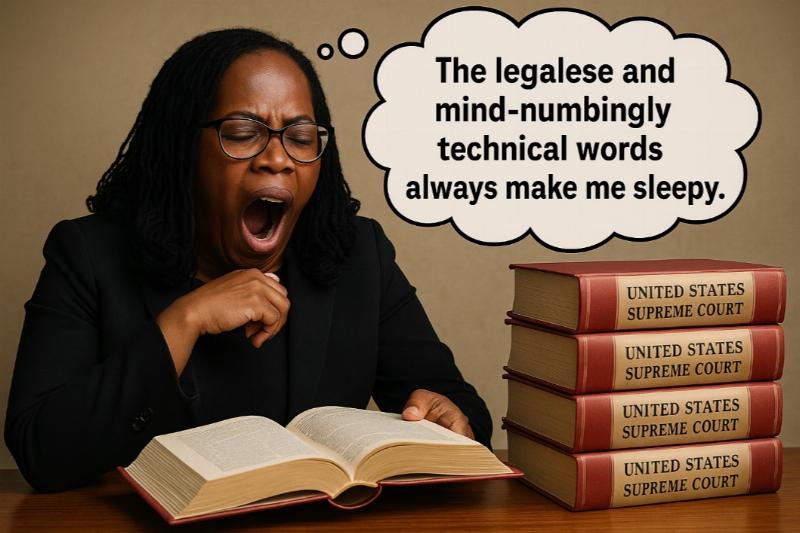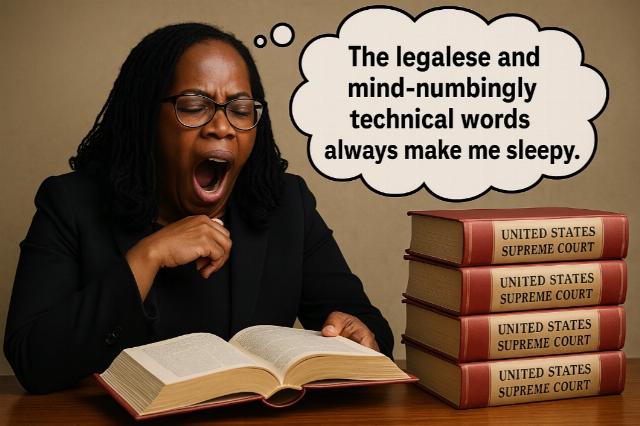


With apologies to Jane Austen, it is a truth universally acknowledged that Justice Ketanji Brown Jackson must have been appointed based on her XX chromosomes (even though she doesn’t know what a woman is) and her melanin level. Take those away, and she is a truly dim bulb. But now that she’s on the Supreme Court, she’s a dim bulb with dreams of an all-powerful (leftist) judiciary.
However, showing that the more intelligent people on the Court have finally lost patience with her, in today’s excellent decision saying that lower courts may no longer issue universal (or nationwide) injunctions, Justice Amy Coney Barrett gives Jackson a smackdown the likes of which I’ve never seen in a Supreme Court decision.
The Supreme Court issued Trump v. CASA, Inc. this morning. Here are some key points from the main opinion.

Image created using ChatGPT.
The underlying facts are that, after Trump issued an executive order ending birthright citizenship, activists rushed to friendly courts. Once there, three of the courts issued universal injunctions barring the administration from applying the order, not just to the plaintiffs, but to the entire country. The appellate courts refused to stay those orders. The Supreme Court, however, agreed to the stay them because federal district courts do not have the authority to issue universal injunctions.
The opinion addresses the district courts’ authority to grant equitable relief. For those unfamiliar with this concept, equitable relief is an area of unique judicial power in the civil (not criminal) sphere holding that, where monetary relief cannot remedy a situation, the court may turn to a historical roster of remedial orders coercing or preventing action.
In the majority decision, Barrett explains that the district courts’ equitable authority comes from the Judiciary Act of 1789, which granted federal courts the same equitable relief power that the British courts had at the time of the Revolution. She also explains that, from 1789 to the present, this power has always been understood to apply only to the parties before the court.
The fact that others might benefit from a plaintiff’s obtaining injunctive relief (as, for example, neighbors made happy when the plaintiff gets an order banning a noisy neighbor from playing loud music into the night), the only relief the court can grant is to the plaintiff. Furthermore, the relief is limited to traditional forms of equity, not whatever the judge wants.
And that’s the whole decision.
What makes the decision glorious is the smackdown that Barrett delivers to Jackson. It opens this way:
The principal dissent [which Jackson wrote] focuses on conventional legal terrain, like the Judiciary Act of 1789 and our cases on equity. JUSTICE JACKSON, however, chooses a startling line of attack that is tethered neither to these sources nor, frankly, to any doctrine whatsoever.
According to Jackson’s own words, although she doesn’t want to be bugged by a “mind-numbingly technical query” about specific principles, she knows the big picture: The federal courts exist to “order everyone (including the Executive) to follow the law—full stop.” In other words, the district courts exist not to protect the parties before them, but to control America.
Barrett and the others in the majority were having none of it. Barrett found it shocking enough that Jackson might be saying that universal injunctions are always the way to deal with cases involving the executive branch, but concluded that Jackson had gone beyond that:
As best we can tell, though, her argument is more extreme still, because its logic does not depend on the entry of a universal injunction: JUSTICE JACKSON appears to believe that the reasoning behind any court order demands “universal adherence,” at least where the Executive is concerned. Post, at 2 (dissenting opinion). In her law-declaring vision of the judicial function, a district court’s opinion is not just persuasive, but has the legal force of a judgment. But see Haaland v. Brackeen, 599 U. S. 255, 294 (2023) (“It is a federal court’s judgment, not its opinion, that remedies an injury”). Once a single district court deems executive conduct unlawful, it has stated what the law requires. And the Executive must conform to that view, ceasing its enforcement of the law against anyone, anywhere.
We will not dwell on JUSTICE JACKSON’s argument, which is at odds with more than two centuries’ worth of precedent, not to mention the Constitution itself. We observe only this: JUSTICE JACKSON decries an imperial Executive while embracing an imperial Judiciary.
But if you think that’s savage, the beatdown gets worse:
No one disputes that the Executive has a duty to follow the law. But the Judiciary does not have unbridled authority to enforce this obligation—in fact, sometimes the law prohibits the Judiciary from doing so. ... Observing the limits on judicial authority—including, as relevant here, the boundaries of the Judiciary Act of 1789—is required by a judge’s oath to follow the law.
JUSTICE JACKSON skips over that part. Because analyzing the governing statute involves boring “legalese,” post, at 3, she seeks to answer “a far more basic question of enormous practical significance: May a federal court in the United States of America order the Executive to follow the law?” Ibid. In other words, it is unnecessary to consider whether Congress has constrained the Judiciary; what matters is how the Judiciary may constrain the Executive. JUSTICE JACKSON would do well to heed her own admonition: “[E]veryone, from the President on down, is bound by law.” Ibid. That goes for judges too.”
Let me say again that, in all my years of reading appellate and supreme court decisions, whether state or federal, I’ve never seen anything like this. And so, while the opinion was a great win for the Trump administration and a necessary brake on out-of-control leftist judges, what social media caught was the fact that Jackson has clearly worn out her welcome amongst the members of the court with IQs over 100. Indeed, even Sotomayor and Kagan wouldn’t join her dissent, while six of the justices signed on to the main decision.
X had thoughts:
???? OMG Justice Amy Coney Barrett basically implied Ketanji Jackson is too dumb or unwilling to read "legalese" - literally her JOB description ????????
— Eric Daugherty (@EricLDaugh) June 27, 2025
She is the most unqualified justice in Supreme Court history. DEI. pic.twitter.com/j7cuh7kWVK
Here’s an important point about the societal damage people like Jackson do:This is a HUGE victory.
— M.A. Rothman (@MichaelARothman) June 27, 2025
Also Justice Barrett slapped the snot out of Justice Jackson who arguably is looking for Judicial Supremacy....
"When a court concludes that the Executive Branch has acted unlawfully, the answer is ???????????? for the court to exceed its power, too." –JUSTICE… pic.twitter.com/Q5ejSUktes
And, for laughs:Ketanji Brown Jackson is a great example of how DEI feeds racial prejudice. When you elevate morons just because of their skin color, people get the mistaken idea that all people of that skin color are morons. It's a terrible thing to do to people. pic.twitter.com/aiwShvasEm
— Joel Berry (@JoelWBerry) June 27, 2025
Everyone on the Left loves to note that Biden made Kentanji Brown Jackson the first black female Supreme Court justice. But they never give him any credit for appointing the first mentally handicapped justice. That’s ableism, and it’s wrong. pic.twitter.com/Dw4JCu5oRt
— Sean Davis (@seanmdav) June 27, 2025
